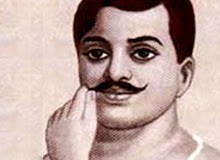Great Reformers of Bharatham : 4.

Sri Ramakrishna Paramhansa Born: February 18, 1836 Passed Away: 16, August, 1886 Contributions: Sri Ramakrishna Paramhansa was a popular saint of India. He had a strong faith in the existence of god. He regarded every woman of the society, including his wife, Sarada, as holy mother. Swami Vivekananda was one of the prominent disciples of Ramakrishna, who later formed the Ramakrishna Mission. Life: The original name of Ramakrishna Paramhansa was Gadadhar Chattopadhyay. He was born into a poor and orthodox Brahmin family on 18 February, 1836 in Kamarpukur, Hooghly district of West Bengal. His parents were Khudiram Chattopadhyaya, and Chandramani Devi. Though Gadadhar was very reluctant going to school, he had a god-gifted ability of painting and creating clay models. He was also good at learning things. He easily mastered the tales, based upon the religion. Young Gadadhar loved the natu...








.jpg)


